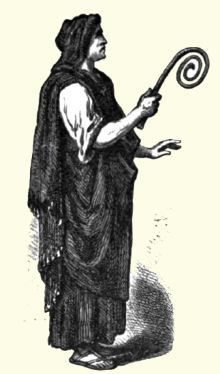Augury


Augury is an ancient practice used for interpreting omens by observing the flight patterns, songs, and behaviors of birds. It was particularly prevalent in Roman religion and culture, where it was considered a state-sanctioned method of divination. Augurs, the practitioners of augury, played a significant role in guiding the decisions of both public and private affairs, ranging from matters of war to personal decisions of the Roman citizens.
History[edit]
The origins of augury are deeply rooted in the early mythology and religion of Rome. It was believed that the gods communicated their will and advice through various signs in nature, with birds being considered the most significant messengers. The practice is thought to have been inherited from the Etruscans, a civilization that predated and greatly influenced Roman culture. Over time, augury became institutionalized, with the establishment of the College of Augurs, a group of priests responsible for interpreting the omens and advising the state based on their readings.
Practice[edit]
The practice of augury involved several steps and rituals. An augur would first delineate a sacred space, known as the templum, within which observations were made. The most common method of augury was observing the flight of birds, such as eagles, vultures, and owls, within this space. The direction of their flight, the behaviors exhibited, and the types of birds seen were all considered significant. Other signs, such as the singing of birds or the appearance of certain species at specific times, were also interpreted.
In addition to birds, augurs might observe other phenomena, such as the behavior of sacred chickens or the patterns seen in the liver of a sacrificed animal, though these methods were more commonly associated with haruspicy, another form of divination.
Cultural Significance[edit]
Augury held a central place in Roman society and governance. No public action, from the calling of assemblies to the declaration of war, could be undertaken without the auspices, or favorable signs from the gods as interpreted by the augurs. This practice underscored the Romans' belief in the importance of divine will in their daily lives and the functioning of the state.
The influence of augury extended beyond the Roman era, leaving its mark on language and literature. The term "inauspicious," for example, derives from the Latin inauspicious, meaning "not of the auspices," indicating something that does not have the favorable signs of the gods.
Decline[edit]
The practice of augury began to decline with the spread of Christianity throughout the Roman Empire. As Christian beliefs, which did not support the interpretation of omens, became more prevalent, the importance of augury and other forms of divination diminished. By the late Roman Empire, augury had largely fallen out of favor, though it continued in some areas and contexts for several centuries.
Legacy[edit]
Today, augury is remembered as a fascinating aspect of ancient Roman culture and religion. It is studied by historians and archaeologists who seek to understand the complex ways in which the Romans viewed the world and their place within it. The practice also continues to capture the imagination of people interested in mythology, ancient history, and the ways in which our ancestors sought to understand and influence their world.
Ad. Transform your life with W8MD's Budget GLP-1 injections from $75


W8MD offers a medical weight loss program to lose weight in Philadelphia. Our physician-supervised medical weight loss provides:
- Weight loss injections in NYC (generic and brand names):
- Zepbound / Mounjaro, Wegovy / Ozempic, Saxenda
- Most insurances accepted or discounted self-pay rates. We will obtain insurance prior authorizations if needed.
- Generic GLP1 weight loss injections from $75 for the starting dose.
- Also offer prescription weight loss medications including Phentermine, Qsymia, Diethylpropion, Contrave etc.
NYC weight loss doctor appointmentsNYC weight loss doctor appointments
Start your NYC weight loss journey today at our NYC medical weight loss and Philadelphia medical weight loss clinics.
- Call 718-946-5500 to lose weight in NYC or for medical weight loss in Philadelphia 215-676-2334.
- Tags:NYC medical weight loss, Philadelphia lose weight Zepbound NYC, Budget GLP1 weight loss injections, Wegovy Philadelphia, Wegovy NYC, Philadelphia medical weight loss, Brookly weight loss and Wegovy NYC
|
WikiMD's Wellness Encyclopedia |
| Let Food Be Thy Medicine Medicine Thy Food - Hippocrates |
Medical Disclaimer: WikiMD is not a substitute for professional medical advice. The information on WikiMD is provided as an information resource only, may be incorrect, outdated or misleading, and is not to be used or relied on for any diagnostic or treatment purposes. Please consult your health care provider before making any healthcare decisions or for guidance about a specific medical condition. WikiMD expressly disclaims responsibility, and shall have no liability, for any damages, loss, injury, or liability whatsoever suffered as a result of your reliance on the information contained in this site. By visiting this site you agree to the foregoing terms and conditions, which may from time to time be changed or supplemented by WikiMD. If you do not agree to the foregoing terms and conditions, you should not enter or use this site. See full disclaimer.
Credits:Most images are courtesy of Wikimedia commons, and templates, categories Wikipedia, licensed under CC BY SA or similar.
Translate this page: - East Asian
中文,
日本,
한국어,
South Asian
हिन्दी,
தமிழ்,
తెలుగు,
Urdu,
ಕನ್ನಡ,
Southeast Asian
Indonesian,
Vietnamese,
Thai,
မြန်မာဘာသာ,
বাংলা
European
español,
Deutsch,
français,
Greek,
português do Brasil,
polski,
română,
русский,
Nederlands,
norsk,
svenska,
suomi,
Italian
Middle Eastern & African
عربى,
Turkish,
Persian,
Hebrew,
Afrikaans,
isiZulu,
Kiswahili,
Other
Bulgarian,
Hungarian,
Czech,
Swedish,
മലയാളം,
मराठी,
ਪੰਜਾਬੀ,
ગુજરાતી,
Portuguese,
Ukrainian
